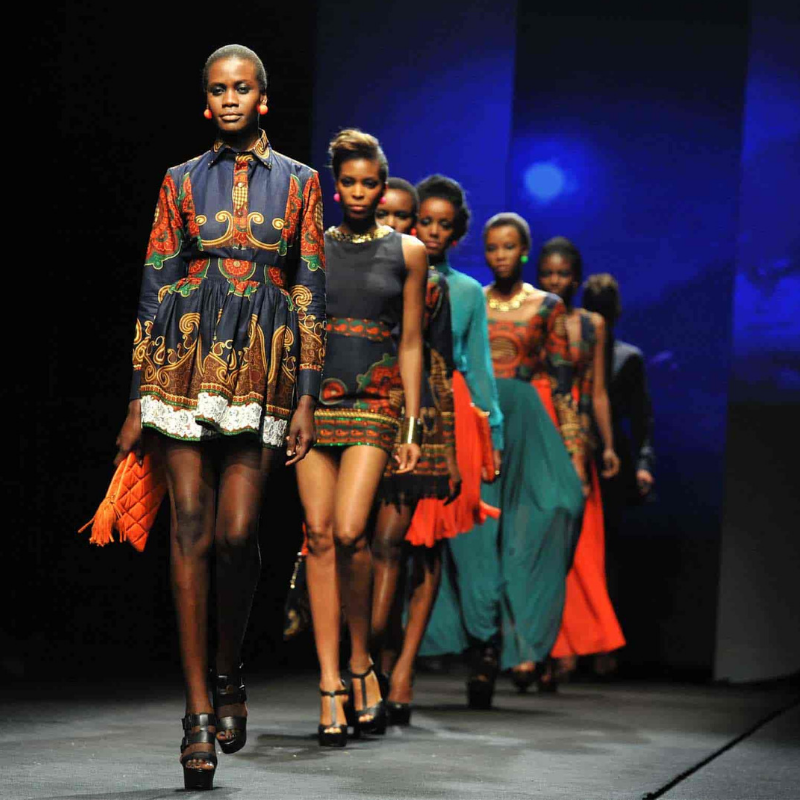In the bustling city of Lagos, Nigeria, a fashion revolution was unfolding. The heartbeat of this transformation was Amara Okafor, a renowned fashion designer whose name was synonymous with innovation and style. Her journey began in a modest studio in the heart of Lagos, where she meticulously crafted garments that spoke to both tradition and modernity.
Amara’s designs were not merely clothing; they were statements. Her ability to blend traditional African textiles with contemporary silhouettes made her a trailblazer in the fashion world. The vibrant colors and intricate patterns she employed were inspired by the rich cultural heritage of the Yoruba people, yet her designs were fresh and forward-thinking. This fusion of old and new set her apart and helped shape the fashion trends not only in Nigeria but across the continent.
In Johannesburg, South Africa, the influence of fashion designers like Amara was equally transformative. Thabo Mokoena, a young designer with a passion for sustainability, was making waves with his eco-friendly collections. Thabo’s designs were crafted from recycled materials and featured innovative techniques that minimized waste. His approach was driven by a desire to address environmental concerns while maintaining a high level of style and sophistication.
Thabo’s work resonated with a growing audience in Johannesburg, where there was a burgeoning awareness of the impact of fashion on the environment. His designs were celebrated for their modern aesthetic and commitment to sustainability, positioning him as a key player in shaping the future of fashion. Through his efforts, Thabo demonstrated that fashion could be both stylish and environmentally responsible, influencing trends and inspiring other designers to adopt similar practices.
Meanwhile, in Nairobi, Kenya, fashion designer Amani Njeri was making her mark with a focus on cultural preservation. Amani’s designs were deeply rooted in the traditions of the Kikuyu people. She used traditional weaving techniques and local fabrics to create garments that celebrated Kenya’s heritage. Her work was not only a testament to her creativity but also a means of preserving and promoting Kenya’s rich cultural legacy.
Amani’s designs were featured in numerous fashion shows and exhibitions, drawing attention from both local and international audiences. Her commitment to cultural authenticity and craftsmanship contributed to a growing appreciation for African fashion on the global stage. Amani’s success highlighted the role of designers in not only setting trends but also in preserving cultural identities.
In Accra, Ghana, the fashion scene was abuzz with the creations of Nana Yaa Asantewaa. Nana Yaa’s designs were characterized by bold prints and innovative cuts that drew inspiration from Ghanaian folklore and history. Her approach to fashion was deeply personal, reflecting her own journey and experiences as a Ghanaian woman. Nana Yaa’s collections were celebrated for their uniqueness and for challenging conventional fashion norms.
Nana Yaa’s influence extended beyond the runway. She actively engaged with local communities, providing opportunities for young designers and artisans to showcase their talents. Her efforts contributed to a thriving fashion ecosystem in Accra, where emerging designers were inspired by her success and motivated to make their own mark on the industry.
Across the continent, the role of fashion designers in shaping trends was becoming increasingly evident. In Dakar, Senegal, designer Fatou Bamba was known for her bold, avant-garde creations that pushed the boundaries of fashion. Fatou’s work was a reflection of her vibrant personality and her desire to challenge traditional fashion norms. Her collections were a blend of traditional Senegalese elements and contemporary design, creating a unique and captivating aesthetic.
Fatou’s influence extended beyond the fashion industry. She was a vocal advocate for diversity and inclusion, using her platform to address issues of representation and equality. Her efforts to promote a more inclusive fashion industry were recognized and celebrated, further establishing her as a key figure in shaping trends and driving change.
In the fashion capitals of Africa, designers were not only influencing trends but also redefining the global fashion landscape. Their work was a testament to the creativity, innovation, and resilience that characterized the continent’s fashion industry. From Lagos to Johannesburg, Nairobi to Accra, and Dakar, African designers were making their mark and setting new standards for the industry.
The impact of these designers was not limited to their own countries. Their work was gaining international recognition, with fashion shows, collaborations, and exhibitions showcasing African talent to a global audience. The influence of African fashion designers was growing, and their contributions were shaping the future of fashion on a global scale.
As the fashion industry continued to evolve, the role of designers remained pivotal in shaping trends and driving innovation. The stories of Amara Okafor, Thabo Mokoena, Amani Njeri, Nana Yaa Asantewaa, and Fatou Bamba were just a few examples of how fashion designers were influencing the world of fashion. Their creativity, dedication, and vision were paving the way for a new era of fashion, where tradition and modernity coexisted, and where style was a reflection of both personal identity and cultural heritage.
The journey of these designers was a testament to the power of fashion to inspire, transform, and connect people across cultures. Their contributions were not only shaping trends but also redefining the boundaries of fashion, making it a vibrant and dynamic industry that celebrated diversity and innovation.
In the end, the role of fashion designers in shaping trends was more than just about creating stylish garments. It was about using fashion as a means of expression, cultural preservation, and social change. The stories of African designers highlighted the profound impact that fashion could have on society, and their legacy would continue to influence and inspire future generations.








